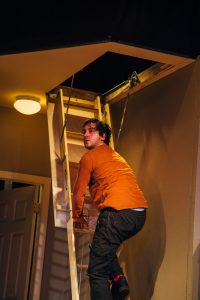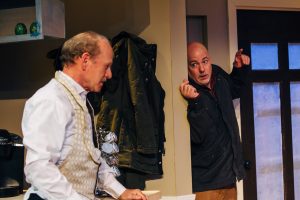ARTIFICIAL INTELLIGENCE VS.
AUTHENTIC EMOTION
Brian Letscher’s new play, now at Pacific Resident Theatre, is pitched as a cutting-edge take on how our species might be affected by new developments in artificial intelligence. The narrative follows a family in Michigan through a night of unexpected developments that challenge their identities in the present, as well as their memories and feelings about the past. It is a fast-paced journey with a Twilight Zone vibe, where getting your deepest wish may or may not turn out to be a nightmare.
At its heart, though, this is an age-old tale of men refusing to listen to women. One female character fights to be heard among three men who all think they know best, and none of them seems particularly interested in her thoughts or feelings, though everything they do is supposedly for her benefit.
 Spoiler alert. The three men include her late husband, unexpectedly brought back to life through the miracle of science. Their adult son has secretly used computer mapping, artificial intelligence, and new DNA technology to create a sort of cyberman version of the dead husband and father. Once the woman’s new boyfriend finds out, he is as horrified as she by the specter of this new species.
Spoiler alert. The three men include her late husband, unexpectedly brought back to life through the miracle of science. Their adult son has secretly used computer mapping, artificial intelligence, and new DNA technology to create a sort of cyberman version of the dead husband and father. Once the woman’s new boyfriend finds out, he is as horrified as she by the specter of this new species.
As Sandy, faced with an unwanted husband back from the dead, Melissa Weber Bales is an actress of subtlety and grace. Yet once the main plot kicks in and her son Benji (Zachary Grant) arrives with the regenerated Ron (Michael Mantell), director Elina de Santos seems intent on keeping things at a frantic speed and volume level that is at odds with what seems to be Ms. Bale’s natural instincts to underplay and find authentic connection to the situation and to the other characters. Her finest moments are small gestures, sadness in repose.
She has a lovely opening sequence with Scott Conte as Victor, Sandy’s new boyfriend. They are both in their fifties, snuggling in the afterglow of a night of passion. They have an extended riff about jam that is utterly charming, and the tone is light and modern. Then Benji arrives and her new life evaporates, along with most of the oxygen in the room. Not only has Benji brought Ron 2.0, but he is on the lam, having stolen him from MIT and the federal government, who are close on his heels wanting Ron back. He represents an investment of over $20 million in research.
Benji’s idea is that since Ron has no clear legal status as a human being; if he can get his parents to remarry immediately, Sandy will have standing as his wife to keep MIT and the feds from spiriting Ron away. Benji brought his daddy back and will do anything to keep him. He cannot process the fact that his mother is none too happy to see her late husband in this new form or in any form. There were problems in their marriage, and while she has missed him in the seven months since his death, she is happier on her own. Benji treats Victor as an annoyance, giving no credence to the idea that Sandy and Victor might want to stay together.
From the start Mr. Grant plays Benji as a lunatic. He is loud and manic, oblivious to his mother’s feelings or anyone else’s, only listening to other characters long enough to form a rebuttal. At no point does Benji hear or see Sandy in any meaningful way. Grant exacerbates the disconnect by yelling throughout, so much so that I can only assume it is a directorial choice. It doesn’t serve him or the play. The character is too shrill to truly engage us. A gun is conveniently left on a shelf in the first sequence. From the moment Benji takes the stage you know he will eventually find that gun and go full-on psycho. There’s no surprise to it.
Mr. Mantell gives Ron an amiable sense of wonder but only once does the text allow his character to truly question the wisdom of coming back into Sandy’s life. Ron talks about evolving at a phenomenal rate inside, processing new information. It seems that he might be on the verge of understanding what a terrible idea it is to simply assume that Sandy will marry him again. False alarm. He forces her to dance with him and expects her to follow, ostensibly to the ends of the Earth.
 Sandy is never taken seriously as a person. She is told she is smart, beautiful, and loving, but no one stops to think about who she is or what she wants. And the Twilight Zone comparison is apt not just because of the spooky “what-if” storyline, but because that series and this show are defined by a sense of male identity being normal and female identity being “the other.” Not unexpected for the late ’˜50s and early ’˜60s. But this is 2019.
Sandy is never taken seriously as a person. She is told she is smart, beautiful, and loving, but no one stops to think about who she is or what she wants. And the Twilight Zone comparison is apt not just because of the spooky “what-if” storyline, but because that series and this show are defined by a sense of male identity being normal and female identity being “the other.” Not unexpected for the late ’˜50s and early ’˜60s. But this is 2019.
There are some logistical issues as well with ages and character histories. Mention is made of Ron working as a shoeshine boy while he was in school as a young man, and his musical touchstones are “Moon River” and Hoagy Carmichael. If he is 55 in 2019, that means he was born in 1964. He would have been a young man in the early ’˜80s. A shoeshine boy sounds like something from the ’˜30s not the ’˜80s, and Sandy and Ron would have come of age listening to Prince, Springsteen, and Madonna. Several references are also made to this being their twenty-fifth anniversary, yet if they met and married in 1992, as is stated several times, this would be their twenty-seventh anniversary.
In the end, it isn’t just Ron’s intelligence that is artificial. The emotional underpinning of the show isn’t grounded in authentic emotion or concern for what makes people love one another and what keeps families together or breaks them apart. On the way out of the theater, I overheard some of the older audience members talking about how timely the subject matter is. On the surface it may seem so, but at its heart Smart Love doesn’t strike me as particularly forward looking.
Smart Love
Pacific Resident Theatre
703 Venice Boulevard in Venice
Thurs-Sat at 8; Sun at 3
ends on February 24, 2019
EXTENDED to March 31, 2019
for tickets, call 310.822.8392 or visit PRT








